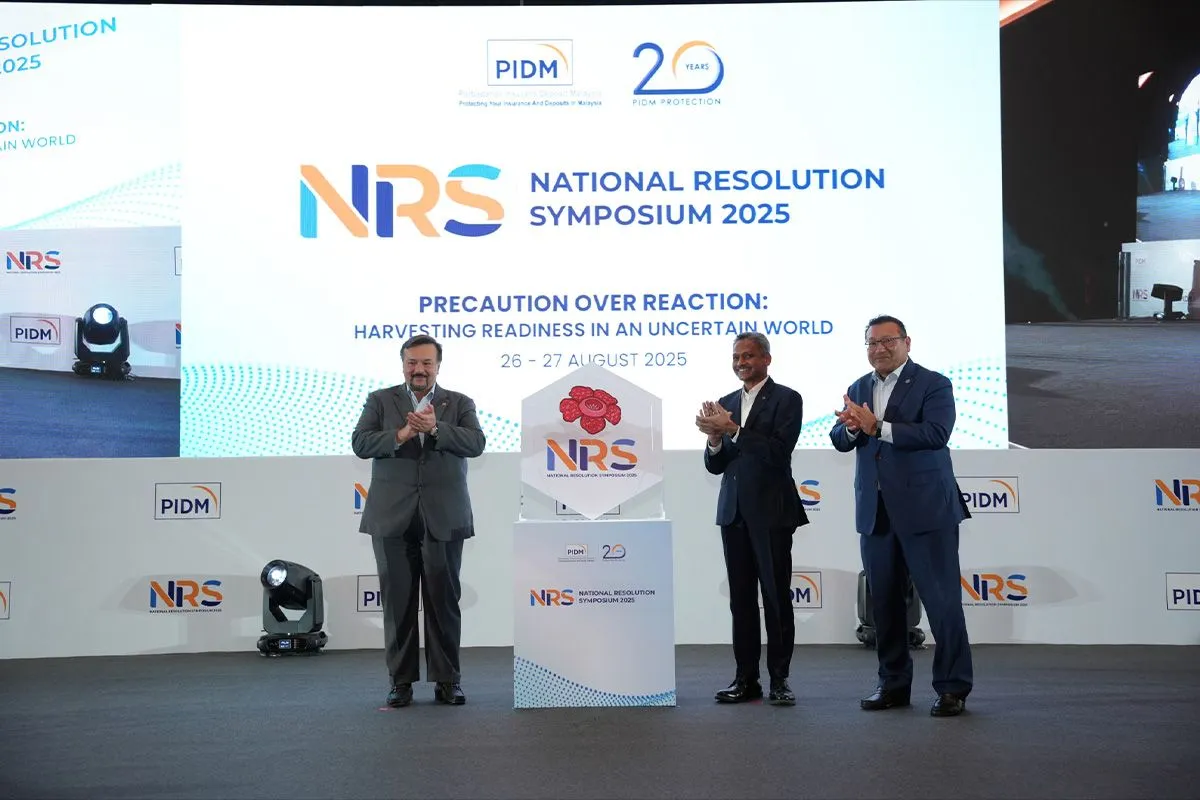
KUALA LUMPUR (Sep 24): Deregulation should not be viewed as the trade-off between growth and stability. When done right, it simplifies rules to unlock growth while preserving the safeguards that underpin financial stability. But if deregulation weakens those safeguards, it risks eroding the very foundation that sustainable growth depends on. That was the key message from the panel discussion “Resolution Planning in the Era of Deregulation” at Perbadanan Insurans Deposit Malaysia’s (PIDM) National Resolution Symposium (NRS) 2025.
The session, moderated by PIDM executive vice-president Afiza Abdullah, featured three seasoned financial stability and bank resolution experts: Dr. Elke König, former chair of the Single Resolution Board (EU); Geoff Davies, director of the Resolution Directorate at the Bank of England; and Maciej Szczęsny, president of the Management Board at Poland’s Bank Guarantee Fund.
The panellists emphasised that deregulation should not be conflated with reduced oversight. Instead, they advocated for streamlining regulatory processes to improve compliance efficiency while preserving the safeguards essential to financial stability.
Financial stability, they stressed, is the cornerstone of sustainable growth – not a trade-off – and resolvability of financial institutions remains a cost-effective way to preserve it. They also highlighted the importance of maintaining flexibility in resolution plans to prepare for a range of eventualities.
König cautioned against sacrificing optionality for the sake of cost-cutting, stressing that plans must remain credible across different scenarios. Davies added that crises rarely unfold as expected, making it essential to test and prepare for multiple contingencies. While this may require upfront investment of resources, he noted, it is far more cost-effective than navigating a crisis without a plan.
Szczesny, drawing from his experience resolving banks in Poland, expressed strong support for deregulation, so long as it focuses on simplifying rules without weakening oversight. He emphasised that frameworks must remain robust to safeguard financial stability, while being practical and proportionate.
“Deregulation should not mean the removal of rules,” he added, “but rather the implementation of smarter, more efficient ones.”
Davies, who oversaw the resolution of SVB UK, noted that deregulation often involves a shift in regulation approach rather than a reduction in oversight. He pointed out how, for example, the rise of digital finance has altered the risk environment.
“Exit strategies must evolve with changing market realities,” he said.
König, who led several high-profile bank resolutions in Europe, stressed that recovery and resolution planning must continue regardless of the regulatory environment. She urged banks to update their plans regularly, rely on accurate data and test their readiness to avoid repeating mistakes from the 2008 global financial crisis.
Insights from Recent Resolution Actions
The panellists also shared experiences from recent cases that underscore the importance of preparedness in managing financial distress including: the 2022 resolution of Sberbank’s Croatian and Slovenian subsidiaries through a share sale by the Single Resolution Board; the resolution of Getin Noble Bank in Poland the same year through capital write-downs, an administrator appointment and transfer to a bridge bank; and the Bank of England’s 2023 resolution of Silicon Valley Bank UK with a share transfer to HSBC to ensure business continuity.
These examples, drawn directly from the panellists’ own leadership roles, illustrate how well-designed resolution frameworks can preserve market confidence, protect depositors, and contain systemic risk in crisis situations
At the same time, Szczesny acknowledged that current frameworks can still improve on the aspect of flexibility and urged regulators to reduce compliance burdens without compromising financial system resilience.
The panellists stressed that while resolution planning cannot eliminate the uncertainty of failure, it provides speed, structure, and credibility in a crisis. They agreed that resilience is no longer optional, and must extend beyond large banks to institutions of all sizes.
In her closing remarks, Afiza reaffirmed PIDM’s commitment to embedding flexibility and transfer-readiness into member banks’ strategies. “Preparedness is no longer optional. Every institution must be ready,” she concluded.
A Call for Proactive Readiness
The panel’s insights were consistent with the broader themes of the symposium, held under the theme of “Precaution Over Reaction: Harvesting Readiness in an Uncertain World”.
In his welcoming remarks, PIDM Chief Executive Officer, Rafiz Azuan Abdullah underscored that resolution planning is a proactive measure, about being ready before a crisis strikes, enabling swift and decisive actions to minimise disruption to the public and the financial system.
Finance Minister II Datuk Seri Amir Hamzah Azizan, who officiated the symposium, urged financial institutions to work closely with regulators such as PIDM and Bank Negara Malaysia to ensure resolution readiness is embedded into business practices.
“In a volatile and interconnected world, readiness is the defining factor between a brief disruption and a prolonged crisis,” he said.
“The stability we enjoy today is built on the foresight of those before us. It is now our responsibility to strengthen that foundation,” he added.